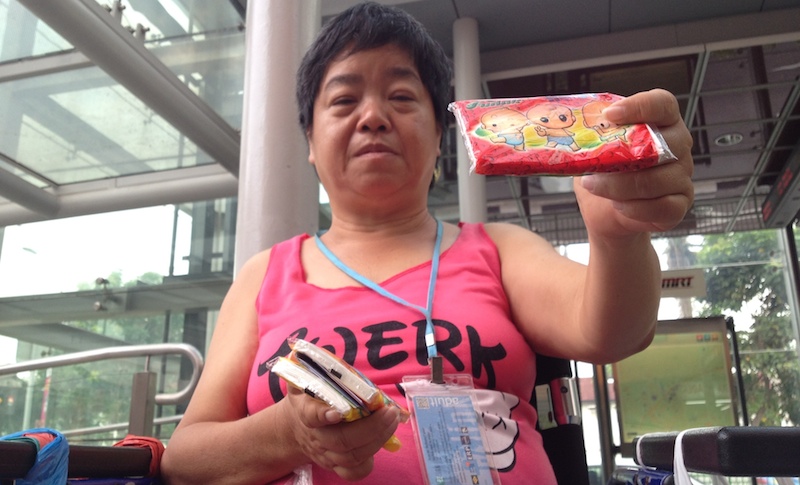In the midst of the crowded streets of Holland Village, she sits in a wheelchair with a bag of tissue paper singing loudly in a hoarse, off-tune voice.
She is the singing tissue peddler, and she says she will not give up her job for any assistance anyone can offer. Not even from the government.
“I started selling tissue paper 10 years ago. I like the freedom I have now. Whatever I sell, it is whatever I earn immediately. There is no middleman. When I am sick, I can take a day off and I will not make any losses.”
She says she used to sell newspapers, but polio and diabetes kept her from minding her stall the whole day. As a result, she never could sell all her papers and constantly made loses.
“I am 55 years old now and I sit in a wheelchair. I can’t speak English. I can barely read Chinese.
“And if you ask me to work as a cleaner, or in a hawker stall, I can’t.
“I know what most people will say to me. They ask me to rely on government’s help.
“But if I spend my entire life living off government’s assistance, then what is my life for? I live a meaningless existence.”
For many tissue paper peddlers, high living expenses also keep them on the streets, she says.
“Even if the government gives us money, the cost of living is rising every year.
“Not right for me to keep asking for aid as my expenses go up. So if peddlers like me cannot sell tissue paper freely, we will die. “
She says she has heard about the National Environment Agency’s (NEA) call to refer tissue sellers to appropriate agencies for assistance. But she is not interested in getting help.
“Let’s say, we take the NEA licence and we are allowed to sell only in specific locations, we still will die.
“You know why? Imagine if you see me every day at the same spot, will you still take pity on me and buy my tissue paper? I tell you the truth, if you see me every day, you will not be buying from me after a while.”
She says she eats bread on days she does not make enough, or is too sick to leave her home in Tampines. But she smiles and shakes her head about her fate.
“Selling tissue paper is not like selling any other product. It is out of charity people buy from you. So you must learn to be grateful.
“I had customers who came to me and said, ‘Aunty, I only have 30 cents.’ I say, “So long you pay me a little, I will be able to buy food, can already.
“I think people understand that selling tissue paper is not about making big money.
“I met a woman once. Her son asked her, ‘Mommy, why you buy tissue? We have so many packets at home.’ She said to her son, ‘Aunty cannot walk. If I buy tissue from her, then she will have money to buy dinner.’”
As the commuters at the Holland Village MRT station rush by, she sings out loud again, “tissue, tissue, tissue, one dollar for three.”

